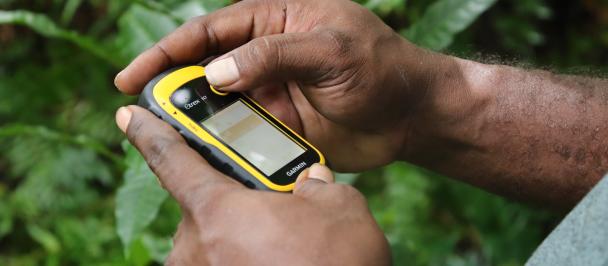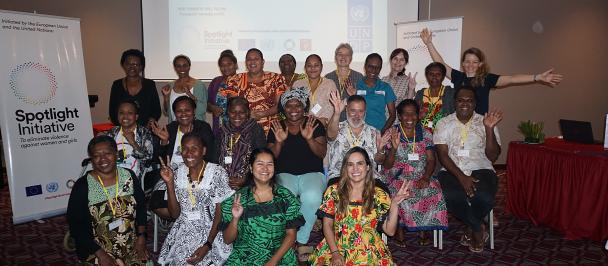Palau's Balancing Act: Border Management and Economic Recovery Post-Pandemic
May 18, 2023

In 2015, a record number of 162,000 tourists flocked to Palau to swim in its turquoise waters and wander along pristine, sandy beaches. By 2022, that number had sunk to a little over 10,000.
For many countries across the Pacific, geographic remoteness combined with quick-thinking government intervention saw COVID-19 kept beyond their respective borders. However, this action was only a temporary measure.
As the virus continued to spread rapidly across communities worldwide, even the most stringent of border controls proved ineffective in halting COVID’s transmission, making it clear that a more comprehensive and long-term solution was needed.
The concept of border management moved front and centre.
As the world continues to adjust to the ongoing effects of COVID-19, economies across the Pacific are looking towards 2023 as being a year of economic recovery. Despite the desire – and need – for financial gain, a balance between economic recovery and the continued implementation of public health measures at our country’s borders is still very much needed.
The tiny, North Pacific nation of Palau is one country – amidst many Pacific Island nations – where this balance is needed most.
With a reliance on tourism as a key economic pilar, Palau closed its borders in early 2020. While this resulted in the invaluable outcome of keeping the population safe, this same decision brought the country’s vibrant tourism industry to a standstill, leaving thousands unemployed and many households with severely diminished incomes.
Prior to the pandemic, tourism was a key source of income for many Palauans. In 2015, a record number of 162,000 tourists flocked to Palau to swim in its turquoise waters and wander along pristine, sandy beaches. By 2022, that number had sunk to a little over 10,0001.

With a reliance on tourism as a key economic pilar, Palau closed its borders in early 2020.
Livelihoods have been lost, businesses that once thrived with their doors now shuttered and closed for good, and many of the flight links that were in place prior to the COVID-19 pandemic still yet to be re-established. Just nine flights per week are now entering Palau, with most of these consisting of what locals refer to as the ‘island hopper’ that circles the entirety of the North Pacific.
Effective border management efforts can not only enhance security but also promote a boost for the tourism industry by creating a safe and welcoming environment for travellers. So too the need for all actors across the border management space – those working in Health, Immigration, Customs, Tourism and Aviation, amongst others – to come together to discuss priorities and the subsequent implementation of legislation to keep Palauans and tourists alike safe.
In September 2020, Palau’s President, Surangel Whipps Jr., signed an Executive Order that bought the country’s Coordinated Border Management (CBM) group to life. Comprising of a broad cross-section of members from across government, the group was created to advise the President on border management matters.
Closing in on three years since its establishment, the group still meets monthly, and while their focus has changed from the implementation of COVID-related safety measures, CBM members are now working on the development of Palau’s integrated border management strategy, and the further digitization of entry requirements for all those who arrive in-country.

John Tarkong Jr. says that while there has been progress, there is more to be done to ensure that further processes shift online.
The Transition to Digital
John Tarkong Jr. would be a name, and face, recognisable to any Palauan. Perhaps best known as a Greco-Roman wrestler who competed in the men's heavyweight category, and for carrying the nation's flag at the opening ceremony of the 2004 Summer Olympics in Greece, he is now the flag bearer for Customs and Border Protection, serving as its Director.
Tarkong Jr, is proud of the work that the CBM group has achieved thus far, while adding that the group continues its efforts to ensure that Palau’s systems and processes are at the cutting-edge of border management practices globally.
“There is a lot that still needs to be done to ensure that we shift further processes online, and moving away from paper forms is certainly something we are looking at. We are moving in the right direction in terms of aligning our systems and transitioning to digital, and the CBM group has certainly helped us in being able to do that,” Director Tarkong said.
However, he added that there is no reason as to why the country can’t take things further, and with support from United Nations Development Programme (UNDP) Pacific Office in Fiji and the Government of Japan, he hopes to see further technological modernisation over the coming months.
“We need to ensure that all visitors to Palau, and citizens of Palau as well, are informed and aware of our entry requirements. I think we can do a better job of doing this, and having these in a central location online, accessible for all, is what we are working on next,” he said.

Sherilynn Madraisau Director of Palau’s Bureau of Public Health was at the forefront of the country’s vaccination campaign.
The Next Step
Sherilynn Madraisau is the Director of Palau’s Bureau of Public Health. Madraisau was at the forefront of the country’s vaccination campaign, and proudly states that Palau remains toward the top of the global vaccination leaderboard.
As of March 2023, a total of 51,032 vaccine doses have been administered across Palau. This being no mean feat given the various challenges faced with vaccinating those in rural and remote areas.
Madraisau also took the lead on digitizing Palau’s Health Declaration Form, with incoming passengers now able to complete the form prior to arrival, generating a QR code that can be scanned by Immigration staff at Palau International Airport.
“It has greatly expedited the arrivals process, since we established the online form back in January of this year. We have taken best practice from around the world in creating this, with the form allowing the option to be completed in a range of languages,” she said.
The next step is to link the Health Declaration Form with Palau’s Customs Declaration, making the entry process for those crossing Palau’s border seamless and 100 percent digital.
“That’s what we are working on at present, linking the databases for Immigration and Customs. The design we use at present is unique, but it is one that we have the utmost confidence in, allowing us to monitor travellers while in country and contract trace should a COVID case come about,” Madraisau said.

Members of Palau’s Coordinated Border Management Group.
An Integrated Approach
Palau’s efforts to digitize its border management activities are supported by the Government of Japan, via the United Nations Development Programme through its Integrated Border Management project. Working alongside key partners - the International Organization for Migration and the United Nations Conference on Trade and Development - Palau, Fiji and Vanuatu are being supported to reinforce their capacities, capabilities and systems for effective and efficient movement of travellers and cargo, and to strengthen links for data and knowledge sharing, inter-agency and cross-regional cooperation.
Japanese Ambassador to the Republic of Palau, H.E. Orikasa Hiroyuki, affirmed his nation’s commitment towards the safe passage of goods and travellers to and from the island nation.
“Japan’s partnership with Palau, and the Pacific as a whole, is a partnership underpinned by mutual trust and respect. As one of our priority areas of cooperation, COVID-19 response and recovery remains high on our agenda, and this digitization work will help in furthering Japan’s objective of facilitating free and robust economic activity throughout the region," he said.
UNDP’s work via the Integrated Border Management Project has seen two national consultations held in Palau, an institutional assessment of key border management agencies conducted, as well as an in-depth discussion on future priorities for the CBM group and its objectives.
With UNDP’s technical expertise within the field of governance, support has also been provided to the Government of Palau on developing the country’s first Strategic Plan on Integrated Border Management – ultimately providing Palau with the required level of preparedness should a traditional or non-traditional emergency hit the country.
Efforts to further digitize border management processes have also been a key area of priority for UNDP, along with the establishment of a Joint Border Risk Assessment Centre for Palau.
UNDP Effective Governance Team Leader (Officer in Charge), Rustam Pulatov, said that the ethos of the project is one of collaboration and knowledge sharing.
“There is no doubt that this lies at the heart of the project, both at the national and regional level. In the case of Palau, it is fantastic to see multiple agencies coming together on a regular basis to ensure that safe movement of both people and goods continues at the country’s borders,” he said.
Palau is moving in the right direction in terms of aligning its systems and transitioning to digital, a country punching well above its weight when it comes to an integrated approach to border management.

 Locations
Locations


